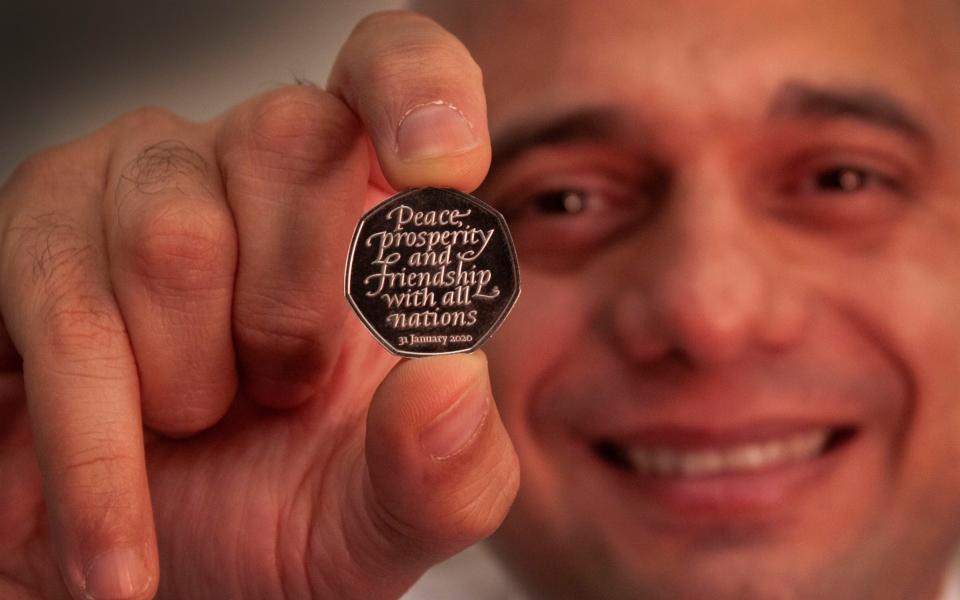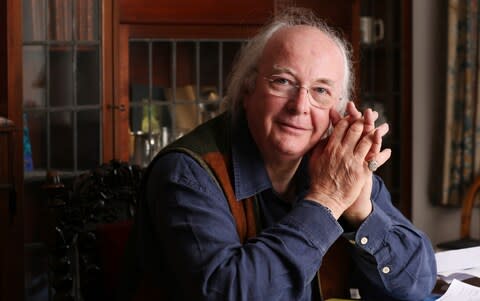Author calls for Brexit coin 'boycott' over lack of Oxford comma

For a time, it seemed nothing could divide the nation more sharply than Brexit.
Today, even that most seismic of issues faced being dwarfed by a new controversy featuring a coin, a quotation, and a comma.
A new 50p coin commemorating Brexit caused a very British conundrum, as fans and critics vied over the absence of the Oxford comma from its phrase “Peace, prosperity and friendship with all nations”.
Sir Philip Pullman, the award-winning author, led the charge, calling for all literate people to boycott the coins. Some claimed the omission of a second comma was “killing” them, while others declared Pullman plainly wrong.
The coin, which had already been condemned by fervent remain supporters for appearing to celebrate Britain’s exit from the EU, will enter circulation on Friday, and bears the date 31 January 2020.
After its image was revealed this weekend, remainers said they would refuse to accept the coin from shopkeepers arguing it would “rub our noses” in the referendum defeat.

By Monday, an even more divisive debate had emerged.
Sir Philip, author of the His Dark Materials series, said on Twitter: “The 'Brexit' 50p coin is missing an Oxford comma, and should be boycotted by all literate people.”
Told the comma was “surely optional”, he said: “Only if you think your readers don't deserve clarity.”
“It makes me even more annoyed,” he added.
Stig Abell, the editor of the Times Literary Supplement, also lamented the coin's punctuation, saying: "Not perhaps the only objection, but the lack of a comma after 'prosperity' is killing me."
Others claimed the Oxford comma, also known as the “serial comma”, is an Americanism and not required in the short sentence on the face of a 50p piece.
Asked for his expert opinion on the matter, Professor David Crystal, linguist and author of more than 100 books on the English language, said there has been “divided usage on this issue for over a century”.

“In the case of the Brexit coin, there is no issue of meaning,” he said. “It is a matter of perceptions of elegance.
“For some, the presence of the comma preserves a neat parallelism between the three nouns. For others, the extra comma adds unnecessary clutter.
“It is, as almost all punctuation commentators have concluded, ultimately a matter of taste.”
Harry Mount, author of Amo, Amas, Amat and All That, said: “Philip Pullman is wrong.
“The Oxford comma is a convention you can choose to follow or choose not to follow. The important thing is to be consistent and stick with whichever convention you choose.
“If you don't use the Oxford comma, there are rare occasions when you might use it to avoid confusion.
“But this instance – 'Peace, prosperity and friendship with all nations' - is not one of those exceptions. It is completely correct.”
The 'Brexit' 50p coin is missing an Oxford comma, and should be boycotted by all literate people.
— Philip Pullman (@PhilipPullman) January 26, 2020
The new Brexit 52:48 is people who think there should be an Oxford comma in the Brexit 50p and people who are wrong
— Alisha Lewis (@Alishacmlewis) January 26, 2020
People complaining about the absence of the Oxford comma on the Brexit coin are the reason Brexit is happening.
— Phil Harrison (@MrPMHarrison) January 27, 2020
A spokesman for the Royal Mint said all UK coin designs go through a “rigorous planning and design selection process governed by an independent panel”.
“The wording on the coin was inspired by a quotation from Thomas Jefferson, which has been adapted by others on several occasions since,” she said.
“We completely respect the views of those who have suggested that there should be an additional comma within the inscription but in this instance the judgement has been taken that the message on the coin is appropriately conveyed in its current form.”
According to the Treasury, around three million Brexit coins will be issued on Friday, with a further seven million due to enter circulation in 2020.
Frances Coppola, who writes on finance and economics, said the punctuation was not essential for the new 50p.
Responding to Sir Philip, she tweeted: "As all literate people know, the Oxford comma is entirely optional.
"But it offends both in its presence and its absence.
"Whatever the choice, someone will think it wrong. There could not be a better commemoration of Brexit."
What is the Oxford comma?
Also known as a serial comma, the Oxford comma derives its common name from its use in by the Oxford University Press (OUP).
The OUP's style guide states: "In a list of three or more items, insert a comma before the 'and' or 'or'." It lists the example: “Red, white, and blue.”
The University of Oxford style guide takes a more nuanced view, saying there is “no comma between the penultimate item in a list and ‘and’/‘or’, unless required to prevent ambiguity”.
“However, always insert a comma in this position if it would help prevent confusion,” it adds, using the example: “She left her money to her parents, Mother Theresa and the pope”.
The University of Cambridge agrees. Its style guide states: “An Oxford comma is one used before an 'and' at the end of a list and is used to avoid ambiguity.”
